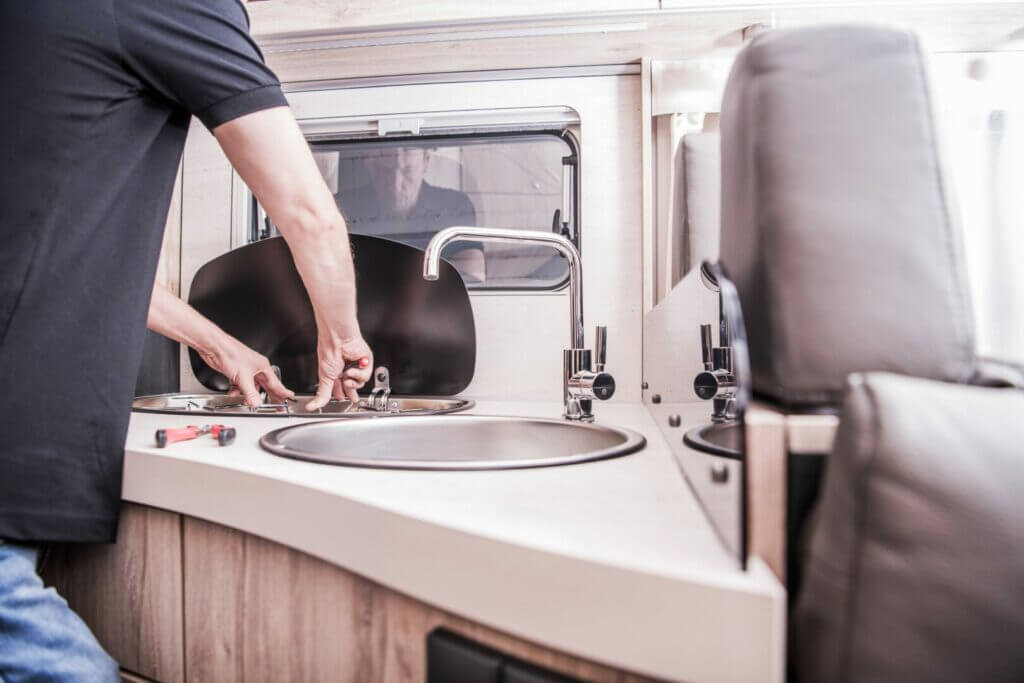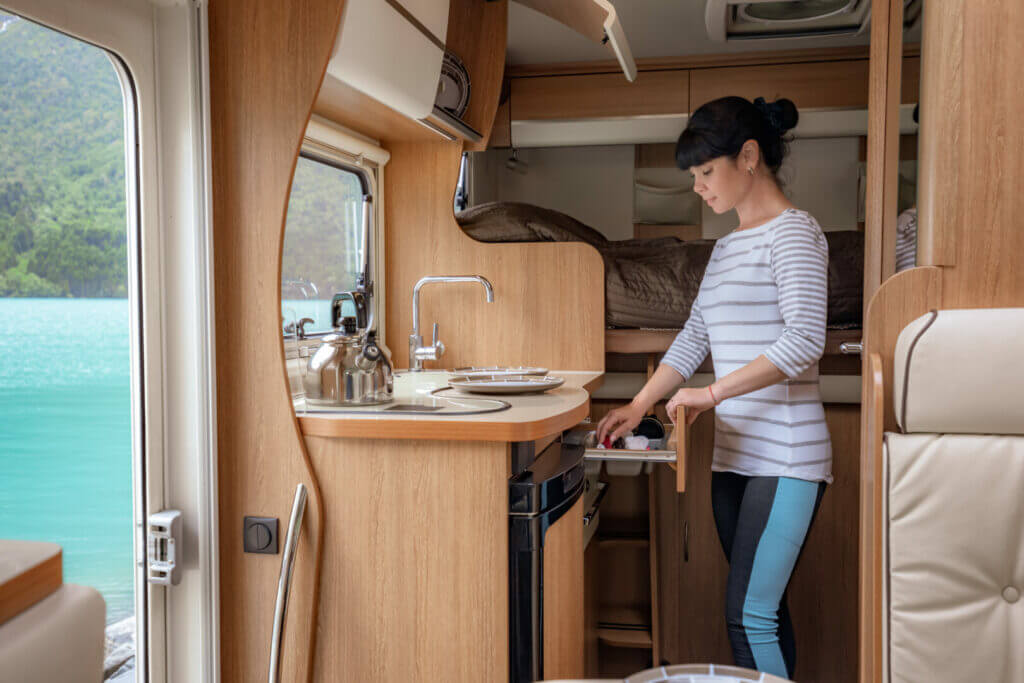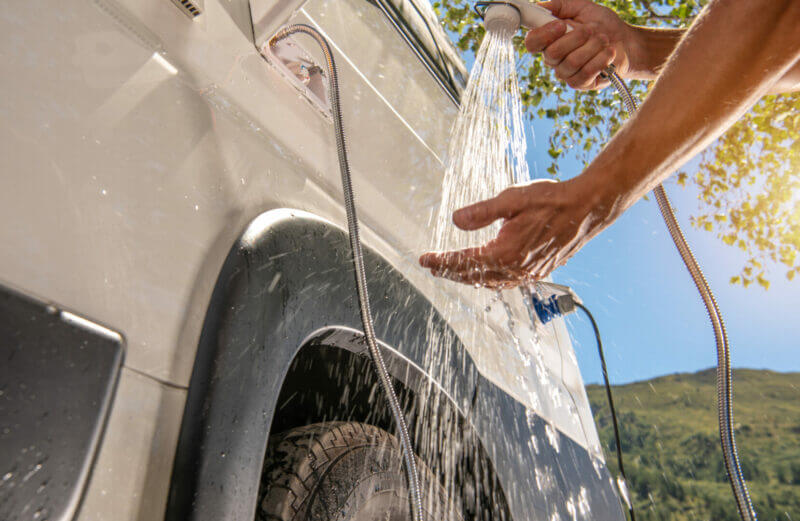Table of Contents Show
A hot shower can be a refreshing way to end a long day full of adventure. Even on the days that aren’t full of adventure, you’ll likely have dishes to wash. An RV water heater ensures you’ll have access to hot water while doing these kinds of tasks. Let’s take a closer look at your RV water heater and how it works!

What Is an RV Water Heater?
An RV water heater provides hot water to your RV’s water fixtures, much like a residential water heater. RV water heaters are either gas, electric, or a combination of the two. A combination water heater will provide the most flexibility in terms of camping styles.
Water heaters range in size depending on the RV. There are even some water heaters that are tankless and provide an unlimited amount of hot water.
Propane Water Heaters
Propane is one of the most common ways of heating water in an RV. Let’s take a closer look at why propane water heaters are so popular among RVers.
How They Work
Propane water heaters often use a pilot light or even a direct spark ignition to heat the water in the tank. They pull water from your hot water tank to send to your fixtures. Once you’ve used your hot water supply, you’ll need to allow the water heater time to reheat.
Many RVers choose to upgrade their propane RV water heater to a tankless water heater. This upgrade provides a seemingly unlimited supply of hot water. However, upgrading to a tankless water heater can be expensive and will use more propane than typical propane water heaters. Despite propane being a relatively cheap heating source, the costs can quickly add up.
When to Use Propane
Propane is an excellent option for heating your water supply when camping off-grid or trying to save a few bucks on your electrical bill. When boondocking or camping off-grid, you need to save every bit of electricity you can. Using propane to heat your water heater tanks fully will take 30-50 minutes, depending on your water tank size.
Pros and Cons
A propane water heater allows RVers to enjoy their RV in remote locations. These heaters can heat water relatively quickly and inexpensively. You can also turn off the water heater if it’ll be a while before you need it again. Many RVs already come equipped with a propane water heater. You likely won’t have to worry about upgrading.
However, you do have to be careful about how often you use your water heater. The 30-50 minutes required to heat a fresh supply of water can be annoying. Larger families may struggle in the evenings, especially between washing dishes and showering.
One of the most significant cons to using a propane water heater is having to stay on top of your propane tank levels. Running out of propane means no hot water. It also means no propane for the furnace and stove.

Electric Water Heaters
An electric water heater can be an excellent option for heating your RV’s water. Let’s see why this type of water heater can be great.
How They Work
Flipping a switch in your RV will turn on the heating element for the water heater tank. This heating element will begin to heat the water in your RV’s water heater tank. An electric water heater takes approximately an hour to heat a six-gallon water heater tank and an hour and a half to heat a 10-gallon tank.
When to Use Electric
Using an electric water heater is a great option, especially while connected to a campground power pedestal. You can turn on your water heater, leave it on while camping, and have a tank full of hot water.
Pros and Cons
An electric water heater takes a considerable amount of time to heat water compared to propane. Spacing out tasks that require large amounts of hot water is even more critical when using electric water heaters.
An advantage to using an electric water heater is that it won’t cost you anything to heat your water while connected to shore power. You also won’t have to worry about running out of propane.
How Do You Maintain Your Water Heater?
Maintaining your RV’s water heater is a relatively painless task. The electrical side of your water heater will require little if any, annual maintenance. The gas side of a water heater will require minimal inspection and cleaning.
Cleaning:
Cleaning your water heater should be part of your regular annual maintenance schedule. Check your RV manual for instructions. Many RV water heaters come with an anode rod to protect the water heater from rust and other potentially damaging minerals. Inspect your anode rod and replace it as needed. Also, drain and flush your water heater tank regularly. There are attachments and wands to help clean out sediment.
Servicing:
During your annual cleaning, inspect your water heater’s connections. This is a great time to apply plumber’s tape to fittings to prevent future leaks. You should also make sure all wiring and connections are in good working order and not showing any signs of wear and tear.
Winterizing:
It’s a good idea to winterize your RV water heater at the end of each camping season or if your RV will be in freezing temperatures for some time. Make sure the water heater has been off long enough that the water in the tank is cool. Use the pressure valve to release the pressure and then remove the drain plug. Allow several minutes for the water to drain. Place the plug back into the water heater and adjust your water system to bypass the water heater for winterization.

Can I Leave My Water Heater on All the Time?
While camping, if you’re connecting to a water source and have sufficient water in your system, there’s no need to turn off your water heater. However, turning off your water heater can conserve electricity and propane. It can also help if your water supply is running low. You can damage a heating element by not having enough water in your water heater when it’s on.
How Long Does It Take an RV Water Heater to Heat Up?
Propane and electric water heaters vary in heating times. A propane water heater will heat up in roughly half the time it takes an electric heater. A propane water heater can heat a six-gallon water heater tank in approximately 30 minutes, compared to around 60 minutes for an electric water heater. The larger the tank, the longer it will take to heat.
Your RV water heater is an integral part of your RV’s water system. It also adds to your comfort while using your RV. If you take care of it, it’ll likely last for a long time. What tips do you have for using your RV’s water heater?






